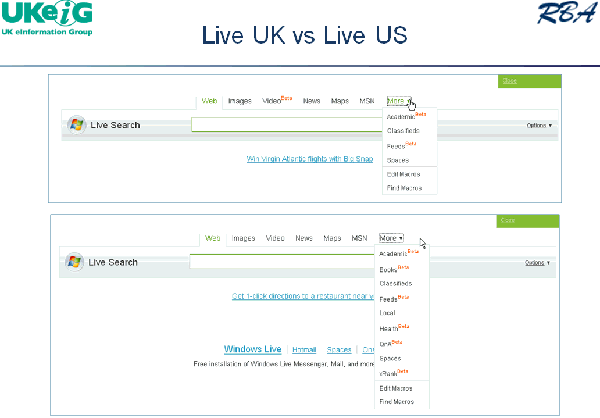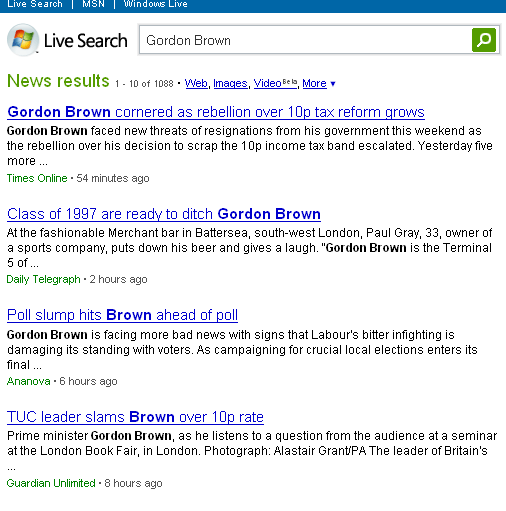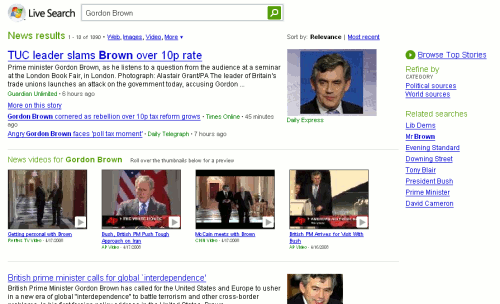Hashtag: #meetbing
Twelve bloggers, including myself and Phil Bradley, were invited to the round table meeting with Microsoft Bing in London on the evening of June 29th. The aim of the event, according to the email correspondence that preceded it, was to outline Microsoft’s plans for Bing in the UK and to obtain feedback and opinions from us. It wasn’t so much ’round table’ as around several tables. Laptops, netbooks and iphones came out at the start of the meeting and we all jostled for positions near power sockets. We were actively encouraged to tweet and blog before, during and after the event to our respective communities in order to spread the word and to elicit feedback from colleagues and friends. And we were provided with free wi-fi. This was definitely a step in the right direction and very different from similar search engine events that I have attended where you do not get through the door unless you have signed a non-disclosure agreement in blood, and you end up in a room that turns out to be a Faraday cage. So full marks to Microsoft on this aspect of the meeting.
The plan was to have a presentation followed by a break, then another session with, I think, questions and feedback throughout. It started off according to timetable with an outline of what Microsoft is doing with Bing. As many UK searchers had already noticed the US version of Bing is very different from the one we have in the UK, which is still in beta. Microsoft wanted to “get traction” in the US first before developing the other country versions further. For example, they hope to be rolling out spell checking of queries in a few weeks.
They then produced some statistics, one of which stated that only 1 in 4 searches delivers a successful result. I questioned where this data had come from and was told it had been collected from MSN search and the toolbar in IE. This then raised the question of how valid their data really is. It was soon after this that the programme fell apart as the questions started to flow fast and furious.
One question was about the size of the Bing index. The Microsoft people dod not seem too sure about this but came up with a figure of approximately 10 billion pages. This surprised me as there have been several occasions when Live, Bing’s predecessor, has come up with unique pages that were not in either Google’s or Yahoo’s index. The index may be smaller, they said, but they are concentrating on quality – although no clues as to how they are doing that – and using humans and neural networks for “training” the ranking algorithms. They believe they will provide search results as relevant to Google in the UK in a few months. One piece of jargon that went completely over my head was tweeted by @leggetter: Microsoft are using NDCG to determine their search result relevance. If like me you haven’t a clue what that is, take a look at http://en.wikipedia.org/wiki/NDCG. In practice, people don’t care about the technology behind the results they just want relevant stuff on that first page and that is what is going to convince people that Bing is worth using.
Microsoft confirmed that they are concentrating on the consumer market, which is obvious from the “verticals” that they are promoting in the US, for example suggesting hotels, comparing airline flight prices, comparing prices for various products. When I asked if they were going to provide a proper advanced search screen, they repeated their mantra of “concentrating on the consumer market” the implication being that “consumers” don’t need advanced search. I beg to differ. Google and Yahoo’s main audience is the consumer market. That is where they make their money, but they still have a decent advanced search screen. Yes, you can do advanced search on Bing such as restricting to filetype but you have to know the commands. Most people acquire their searching preferences and skills at school, university, work or in the public library. If you get stuck you ask a colleague, the librarian or someone in the information centre what to do next. They may suggest a different search tool or show you how to use the advanced search screen boxes on Google or Yahoo. Filling in boxes is far easier for many people than having to remember and type in command line prefixes. And what people learn and find useful at school or in the workplace they continue to use when they search at home.
It was around this point in the discussion that Phil Bradley said “Nothing new here, nothing that excites me, nothing that is innovative”. And I have to agree with him. UK Bing at present is simply a rebadged version of Live.com. The Microsoft people admitted that it is not as good as it should be but affirmed their commitment to its development long term. We shall have to wait and see. The UK team obviously passionately believes in the product but Microsoft does not have a good track record when it comes to following through on new initiatives. Academic Live was far superior to Google Scholar and its Live Books had content and advanced search features that Google Books did not. Both services were axed in May 2008.
And finally there is the issue of censorship. Phil Bradley has repeatedly raised this with Bing directly, via his blog and on Twitter but so far has had no satisfactory response, and the Bing people at the meeting did not seem to know what is going on. For background on this see Phil’s blog postings The Microsoft Bing Meeting, Bing: excluding results from UK version? and More on Bing removing UK content.
Overall, I am not sure what to make of the meeting. I suspect that Bing were expecting to be able do a straightforward sales pitch with a few easy questions from a tame audience, which we most definitely were not! I must congratulate the Bing people, though, for the cool way in which they handled the meeting. There was a lot of scribbling of notes on their side and promises to look into our concerns and questions. I had received several questions and comments from friends and colleagues but there was not enough time to raise them at the meeting itself. Apart from the ridiculously short amount of time available to us – we had two and a half hours – there was a mixture of web developers, web 2.0 gurus and serious web searchers (Phil Bradley and myself) at the event and most of us had long lists of questions. I would definitely attend a second meeting but it would be more productive if they had separate events for developers and searchers.
So would I recommend Bing as a search tool? Yes, but purely because I have always included Live.com in my list of essential search engines and Live now redirects to Bing. Bing is different from Live in the way it handles results but for some of my business searches it still sometimes pulls up unique results. (I will look at Bing search results in more detail in a separate posting). Is it a Google beater? I would love to see Bing give Google a run for its money but I can’t see it happening at present.
Other blog postings on the meeting include The Microsoft Bing Meeting, Phil Leggetter – Microsoft Bing.com round table thoughts, Bing Roundtable: Where was the innovation? : David Stuart, Web Reflection: UK Bing Roundtable – Just My Opinion. Apologies if I have missed anyone.



